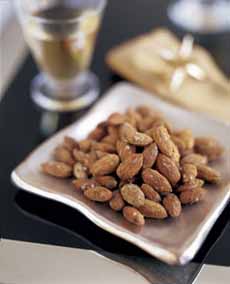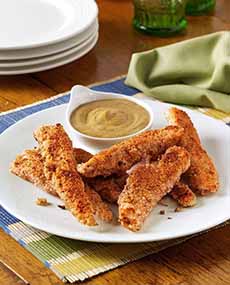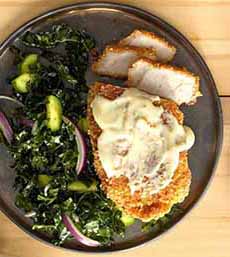20 Ways To Enjoy Almonds For National Almond Day
 [1] Almonds: delicious and good for you (photo © National Almond Board).
|
February 16th is National Almond Day. Almonds have long been known to have heart healthy benefits* (more about them below). Healthcare professionals recommend them for snacks, as substitutes for other foods, and even for breakfast. Fans of The Devil Wears Prada may recall one of the model-like magazine staffers counting out seven almonds for breakfast. You can actually have 25-30 shelled whole almonds each day. And you can enjoy almond nutrition in different forms, such as almond butter, almond meal (almond flour), almond milk and almond paste. Below: Elsewhere on The Nibble: > The year’s 8+ almond holidays. > The year’s 38 nut holidays. Our 20 tips don’t include recipes, but you can find plenty of almond recipes at AlmondBoard.com. Raw or roasted, plain, glazed or flavored, almonds are great snacking. The USDA has declared them heart-healthy, and the daily allotment per the FDA is 1.5 ounces, about 25 almonds depending on size. One ounce will fill a 1/4 cup measure, and you can actually purchase an attractive tin that holds exactly that many ($1.87—or recycle a mint tin to hold almonds). The tin fits easily in your pocket for grab-and-go. Give them, filled with almonds, as a nutritious gift. Enjoy almonds as: Almonds are an excellent source of vitamin E, magnesium and manganese and a good source of fiber, copper, phosphorous and riboflavin. When compared ounce for ounce, almonds are the tree nut highest in protein, fiber, calcium, vitamin E, riboflavin and niacin: a petite package with a powerful punch. |
|
|
A one-ounce serving has 13 grams of good unsaturated fats, just 1 gram of saturated fat, and is cholesterol-free. Unsaturated fat is the “good fat” that your body needs, and that may help lower low-density lipoproteins (LDL or “bad” cholesterol). You can find the studies here. One ounce of almonds (about 20 to 24 shelled whole almonds) provides 35% of your daily value for vitamin E, an antioxidant that may help promote healthy aging (a study reported in the Journal of the American Association [June 26, 2002] suggests a diet rich in foods containing vitamin E may help protect some people against Alzheimer’s disease). So Happy National Almond Day. Enjoy them guilt-free. ________________ CHECK OUT WHAT’S HAPPENING ON OUR HOME PAGE, THENIBBLE.COM. |
||





